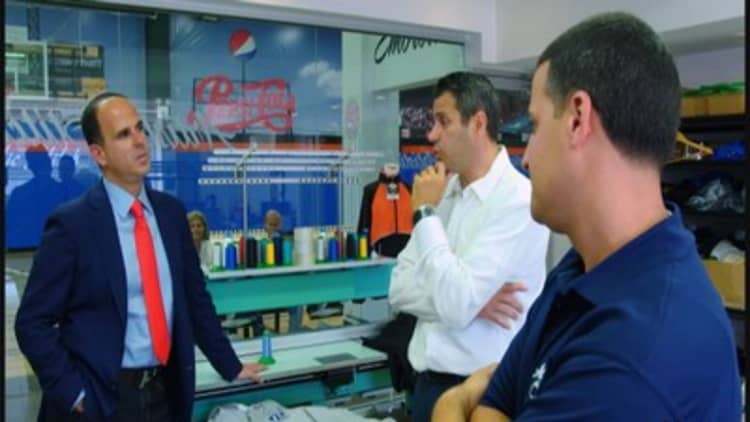
The vision to want to go bossless is one thing, but to actually become an entrepreneur requires the right balance of risk combined with passion, drive and even ego. But if that conceit grows into delusions of grandeur, it can cause a business to stray from its core, creating an identity crisis that ultimately kills it.
One example of a company that may have grown too big for its britches is Artistic Stitch. Sal Loretta started the company in his garage almost two decades ago; it's since grown into a $2 million-a-year business.
Yet, despite the core embroidery and silk-screening aspects generating profits, Artistic Stitch has fallen $1.5 million in debt. It's a result of the owners straying too far from their original mission, according to Marcus Lemonis of CNBC's "The Profit."
The world's weirdest mall
Two years ago, Loretta moved Artistic Stitch into a 28,000 square foot warehouse in Queens, New York. Besides embroidery and silk screening, he built the facility to include an Italian restaurant, a sign company, and a sports complex with baseball batting cages and a basketball court. No bank would finance the project so he used his savings.
"You go to the bank, and they say what are you building? A sports complex? Embroidery? What the hell is going on over there? Flat out, no. Too risky," he said.
Read More Is family ruining your business? Fire them, Lemonis says
Lemonis said he felt like he entered the "world's weirdest mall," when he first visited Artistic Stitch.
Loretta's goal was to increase revenue by adding the new businesses, but admits none are profitable. Lemonis isn't surprised.
Artistic Stitch is in an identity crisis, and Loretta must go back to the company's original objectives, Lemonis said.
"Who wants to sit here and watch kids play basketball and pay for fine dining," he said.
A lesson in vertical integration that isn't unique
It's OK for a business to expand, but it must do so in ways that complement it. Business owners must focus and capitalize upon what generates money. Batting cages have nothing to do with Artistic Stitches' core; which is what Loretta needs focus on growing and expanding.
"Vertical integration is growing a business on a common platform," Lemonis said.
Read More Save the earth—Eat a cup
He gives the example of an auto dealership. A customer can buy a car, service it, buy parts, and get financing and insurance all in one place. Sounds like common sense and yet, in an earlier episode from season two of "The Profit," Lemonis encountered an auto dealership that was heavily in debt due to seemingly misplaced spending by its owner.
Athans Motors had been in business for four years and was $4 million in debt. Its owner, Pete Athans had spent more than $2 million creating a showroom with custom-painted murals on the ceiling, and a customer lounge with video arcade games and a big-screen cinema section with movie theater seats.
Just like Loretta, Athans thought he was building something truly unique. But Lemonis couldn't understand why Athans thought any of that would help sell cars, especially when the lot barely had vehicles on it.
Lemonis took charge, ridding the showroom of the distractions and turning it into a retail shop where customers could buy automotive products, rather than play video games. That's proper vertical integration.
The Profit, a reality series with multimillionaire Marcus Lemonis turning around struggling companies, including Artistic Stitch, airs all-new episodes Tuesdays on CNBC at 10 p.m. ET/PT.



